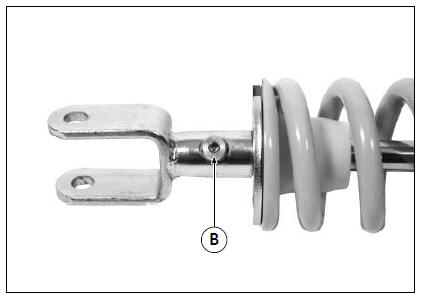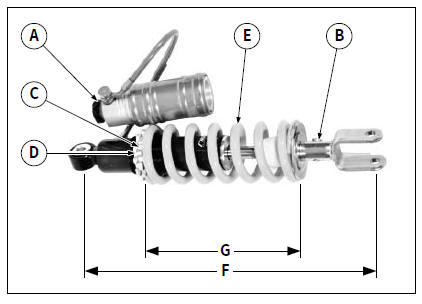 Fantic Caballero 500 - Owner's Manual > Rear suspension (Rally)
Fantic Caballero 500 - Owner's Manual > Rear suspension (Rally)
The rear shock absorber is equipped with:
- Register for compression adjustment;
- Register for extension adjustment;
- Ring nut register for adjusting the shock absorber spring preload;
- Ring nut register for locking the shock absorber spring preload;
- Rear shock absorber spring;
- Preloaded shock absorber wheelbase
Standard value = 344 mm (13.54 in); - Spring preload
Standard value = 176 mm (6.93 in).

Adjustment

The standard adjustment of the rear shock absorber is designed to adapt to most driving styles and situations, however it is possible to make custom adjustments.
To adjust the rear shock absorber spring extension it is necessary, initially, to fully close the adjustment screw "B" turning it clockwise.
Turn the adjustment screw "B" counter-clockwise, counting 8 clicks.

Total number of clicks "B" = 16 (from fully closed).

To adjust the hydraulic brake compression during the compression it is necessary, initially, to completely close the adjustment knob "A" turning it clockwise.
Turn the adjustment knob "A" counterclockwise, counting 13 clicks.

Total number of clicks "A" = 24 (from fully closed).

Adjust the rear shock absorber preload as follows:
- Unscrew the locking ring nut "C";
- Use the adjustment ring nut "D" to adjust the shock absorber spring preload "E";
- Screw in to increase the preload, vice versa, unscrew to decrease it;
- After the adjustment, tighten the locking ring nut "C".

Do not force the rotation of the ring nut registers "C" and "D" beyond the stroke end in both directions, to avoid possible damage.

See also:
 Fantic Caballero 500 - Owner's Manual > Front wheel suspension
Fantic Caballero 500 - Owner's Manual > Front wheel suspension
For the replacement of the front suspension oil, go to an authorized Fantic Motor Service Center. For the maintenance operations, refer to the "SCHEDULED MAINTENANCE TABLE" section, under "Fork".
 Fantic Caballero 500 - Owner's Manual > Clutch lever and gearbox
Fantic Caballero 500 - Owner's Manual > Clutch lever and gearbox
Perform the clutch adjustment when the engine stops or the vehicle tends to move forward with the clutch lever and the gear engaged, or if the clutch "slips", causing an acceleration delay with respect to the engine rpm.
 Ducati Scrambler
Ducati Scrambler Fantic Caballero 500
Fantic Caballero 500 Indian FTR 1200
Indian FTR 1200 Moto Guzzi V85 TT
Moto Guzzi V85 TT Royal Enfield Bullet Trials Works Replica
Royal Enfield Bullet Trials Works Replica Triumph Scrambler 1200 XE
Triumph Scrambler 1200 XE Triumph Street Scrambler
Triumph Street Scrambler Yamaha XSR700
Yamaha XSR700 Ducati Scrambler 800
Ducati Scrambler 800 Moto Guzzi V85 TT
Moto Guzzi V85 TT Triumph Scrambler 1200 XC
Triumph Scrambler 1200 XC